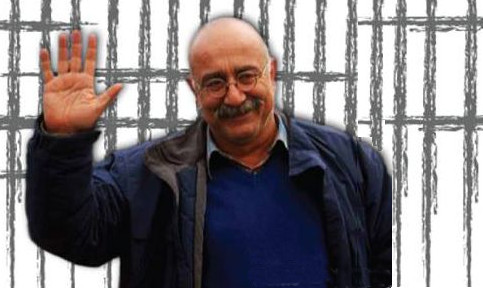 Die Verleihung der Auszeichnung durch die Diaspora-Ministerin der Republik Armenien in Istanbul war eine günstige Gelegenheit, um auf das Schicksal des seit 2014 inhaftierten armenischen Autors, Wissenschaftlers und Menschenrechtlers aufmerksam zu machen. Insgesamt haben sich die Haftstrafen für S. Nişanyan auf 14 Jahre addiert. Herr Nişanyan erhielt sie im Wesentlichen für behördlich ungenehmigte Restaurations- und Konservierungsarbeiten in dem vormals griechischen Dorf Şirince (nahe Ephesos bzw. Izmir) sowie für islamkritische und von der türkischen Justiz als Blasphemie gewertete publizistische Äußerungen. So nahm stelltvertretend für Herrn Nişanyan dessen Anwalt Ergin Cinmen die Medaille entgegen.
Die Verleihung der Auszeichnung durch die Diaspora-Ministerin der Republik Armenien in Istanbul war eine günstige Gelegenheit, um auf das Schicksal des seit 2014 inhaftierten armenischen Autors, Wissenschaftlers und Menschenrechtlers aufmerksam zu machen. Insgesamt haben sich die Haftstrafen für S. Nişanyan auf 14 Jahre addiert. Herr Nişanyan erhielt sie im Wesentlichen für behördlich ungenehmigte Restaurations- und Konservierungsarbeiten in dem vormals griechischen Dorf Şirince (nahe Ephesos bzw. Izmir) sowie für islamkritische und von der türkischen Justiz als Blasphemie gewertete publizistische Äußerungen. So nahm stelltvertretend für Herrn Nişanyan dessen Anwalt Ergin Cinmen die Medaille entgegen.
Zahlreiche Organisationen und Persönlichkeiten im In- und Ausland würdigten das Werk Sevan Nişanyans anlässlich seiner Auszeichnung, darunter auch die Vorsitzende der Arbeitsgruppe Anerkennung, Tessa Hofmann.
Link:
Grußwort
Prof. h.c. Dr. phil. Tessa Hofmann (Savvidou)
Dear Mr. Nisanyan (Nshanyan), distinguished colleague,
Although we never met in person, it is an honor and privilege for me to send my address at the occasion of being awarded with the William Saroyan medal, given by the Diaspora Minister of the Republic of Armenia. It is a more than well received recognition of your achievements.
I address to you as a colleague, both in philology and human rights, who is concerned about the crime of ethnocide, or cultural genocide. Ethnocide is committed during and in the aftermath of genocides. The initiator and author of the UN Convention on the Prevention and Punishment of the Crime of Genocide, Raphael Lemkin, emphasized that this crime bears a significant, fatal dimension for national, and in particular minority cultures; Lemkin defined genocide as
“(…) a coordinated plan of different actions aiming at the destruction of essential foundations of the life of national groups, with the aim of annihilating the groups themselves. The objectives of such a plan would be disintegration of the political and social institutions, of culture, language, national feelings, religion, and the economic existence of national groups, and the destruction of the personal security, liberty, health, dignity, and even the lives of the individuals belonging to such groups. (…)”
Since more than twenty years, your activities as a defender of human rights and as a scholar focus on the documentation of ethnocide and the attempt of conserving and restoring the architectural heritage of the erstwhile Greek (rum) village of Kirkitsa (Kırkı(n)ca, today Şirince) that has been left after the Ottoman genocide(s). The Greek author Dido Sotiriou has described and later visited Kirkitsa as the native village of the protagonist Manolis Axiotis in her famous non-fictional novel „Ματωμένα Χώματα” (“Matomena Homata”, i.e. „Bloodied Soil“, 1962; English title: „Farewell, Anatolia!”); so far, this novel saw 16 editions in Turkish.
Your Index Anatolicus and your books Adını Unutan Ülke (2010) and Hayali Coğrafyalar are powerful and helpful tools for those who want to fathom the real dimension of losses and dispossession.
Your outspoken criticism and your activities in conservation have brought upon you repeated prosecution and sufferings by the executive and legal system of a state that has never come to terms with the massive crimes that had been committed in its name and during the years of its emergence. The stubborn refusal of elites and all statesmen that originate from such elites to face the past have created a situation where crime generates more crimes and transformed violence into an allegedly acceptable tool of domestic policies. Such situations were and are, first of all, highly dangerous to members of minorities, be they ethnic, religious or sexual. Looking on the history of Armenian authors and intellectuals during the early 20th century we find too many tragic examples. Looking on your fate we note a worrying continuity: Being a Turkish citizen of Armenian origin, being a critical and outspoken intellectual and living in Turkey are still seemingly incompatible capacities, even in the 21st century.
We cannot but hope for soon changes. We cannot but work harder for these changes, in Turkey and outside. This, my dear and most distinguished colleague Sevan, must be the aim for all of those who mean well with Turkey, its minorities and with you personally.
I send my heartfelt congratulation and wishes,
Yours,
Tessa Hofmann
